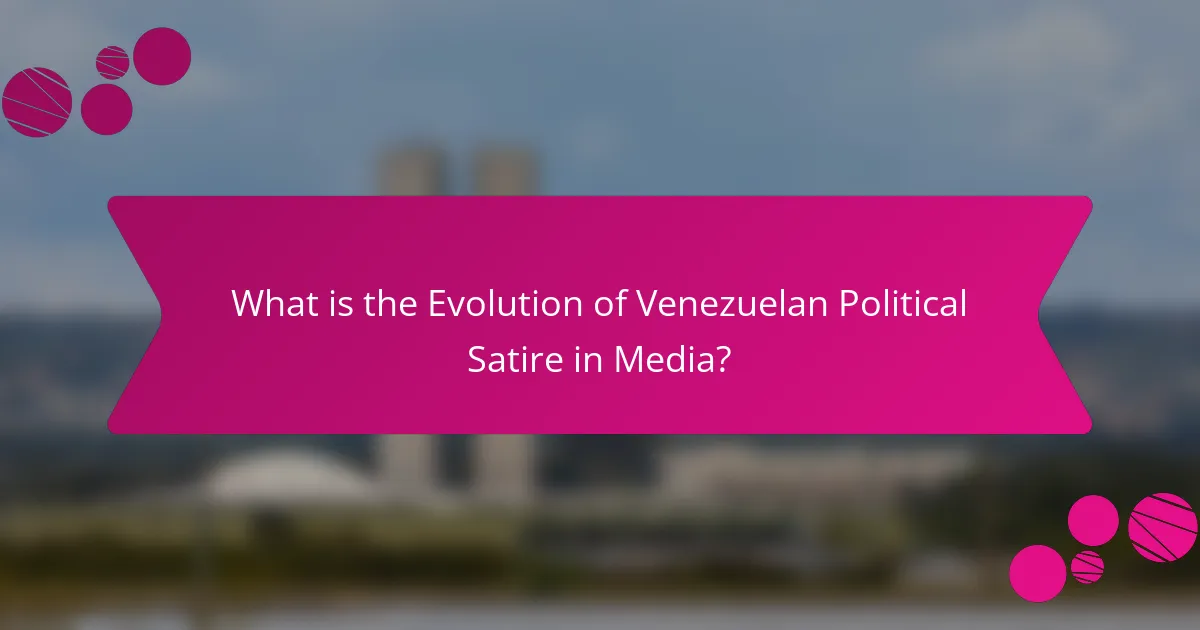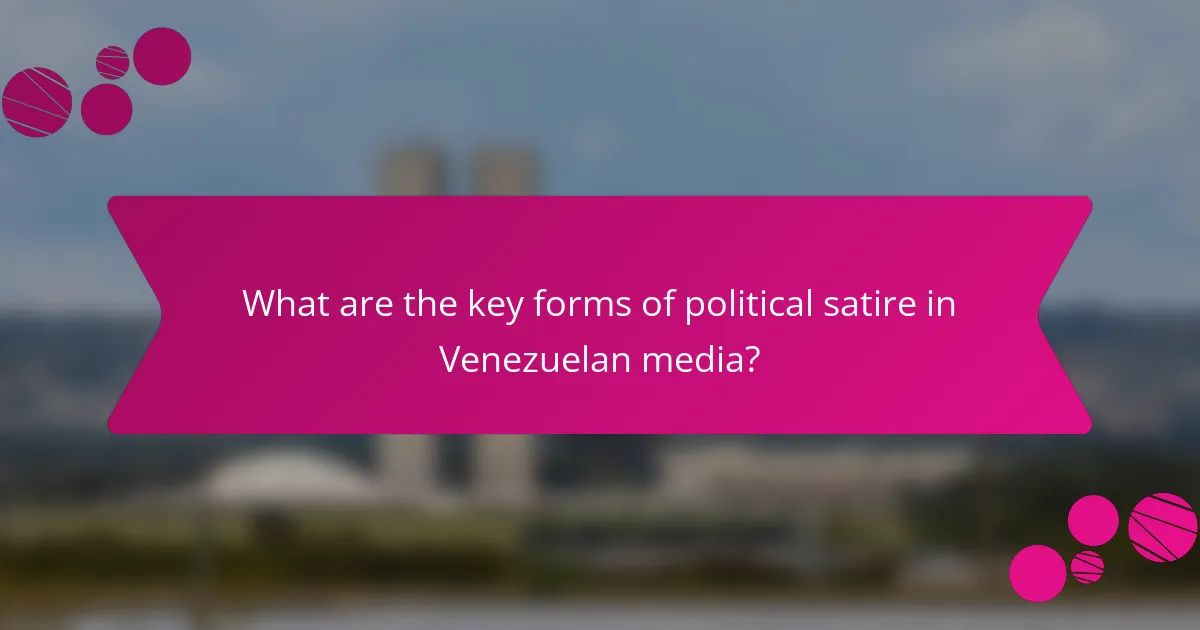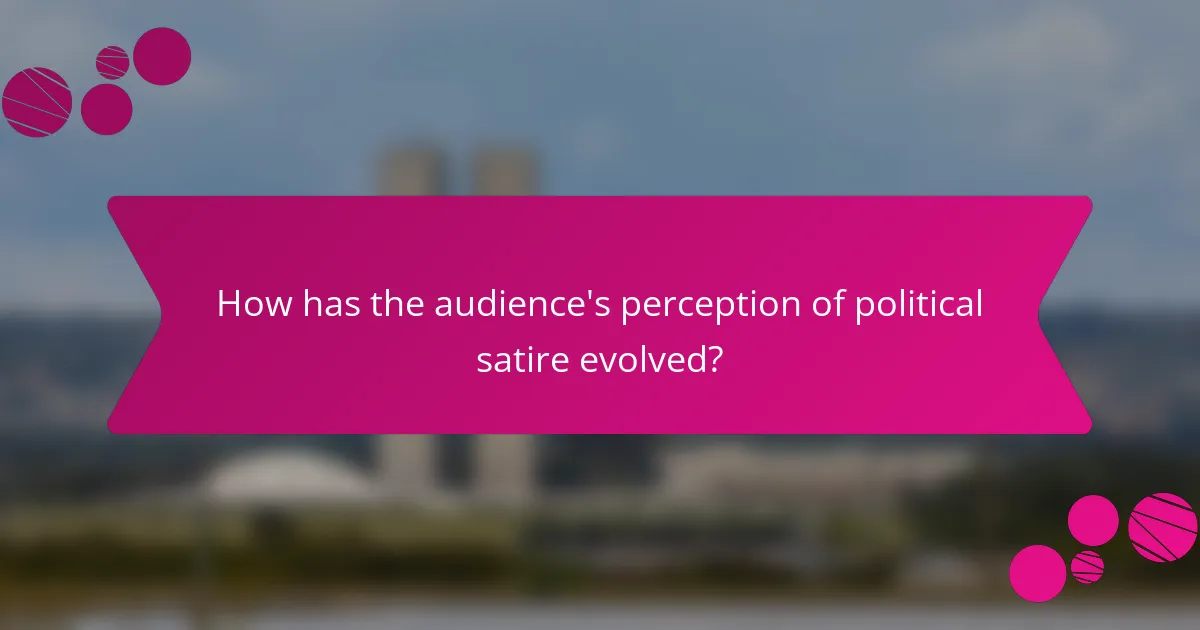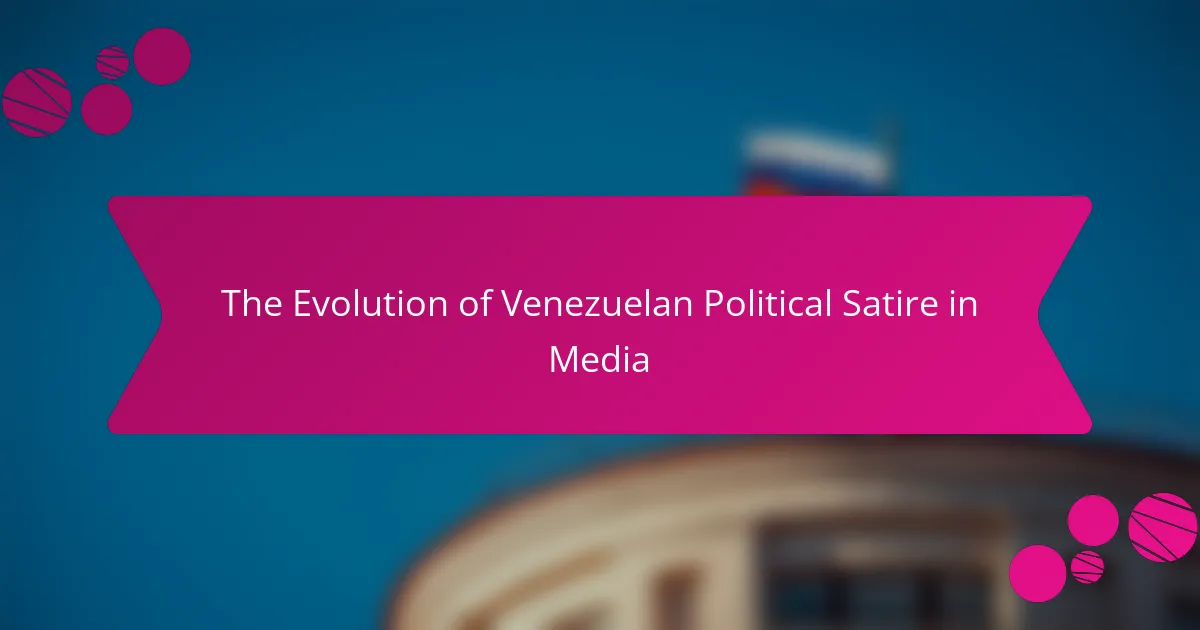
What is the Evolution of Venezuelan Political Satire in Media?
Venezuelan political satire in media has evolved significantly over the decades. Initially, political satire emerged in print media during the early 20th century. This period featured caricatures and humorous critiques of political figures. With the rise of television in the 1960s, satire transitioned to visual formats. Shows like “La Tele” became popular for their comedic takes on current events.
In the late 1990s, the political landscape shifted with Hugo Chávez’s presidency. Satirical content became more contentious as the government began to censor media. Despite these challenges, platforms like social media emerged, allowing for new forms of satire.
In recent years, satirical content has gained international attention. Programs such as “El Chigüire Bipolar” have utilized the internet to reach broader audiences. This adaptation reflects the resilience of Venezuelan satire in the face of political repression. Overall, the evolution showcases a dynamic interplay between media, politics, and public discourse.
How has Venezuelan political satire developed over time?
Venezuelan political satire has evolved significantly over the decades. Initially, it emerged in the early 20th century as a response to authoritarian regimes. The rise of print media facilitated the spread of satirical content. During the 1958 democratic transition, satire flourished as a tool for political critique. The advent of television in the 1980s expanded its reach and impact. In the 2000s, the Chávez administration faced increased satire due to its controversial policies. Digital media has since transformed satire, allowing for rapid dissemination and audience engagement. Today, social media platforms serve as vital spaces for political commentary and humor. This evolution reflects the changing political landscape and the resilience of satire in Venezuelan culture.
What historical events have influenced Venezuelan political satire?
Venezuelan political satire has been significantly influenced by key historical events. The rise of Hugo Chávez in 1999 marked a turning point. Chávez’s populist policies and confrontations with the media fueled satirical responses. The 2002 coup attempt against Chávez also sparked intense political commentary. This event showcased the media’s role in shaping public perception. The economic crisis beginning in 2014 further intensified satire as citizens faced hardship. The government’s censorship efforts have led to creative forms of expression in satire. The historical context of authoritarianism has shaped the themes and styles of satire in Venezuela. Each event has contributed to the evolution of political satire as a critical tool for social commentary.
How has the style of political satire changed in Venezuela?
The style of political satire in Venezuela has shifted from traditional forms to more digital and multimedia expressions. Historically, satire was primarily presented through print media, such as newspapers and magazines. However, with the rise of social media, platforms like Twitter and Instagram have become key outlets for satirical content. This transition allows for rapid dissemination and engagement with a wider audience. Additionally, political cartoons and sketches have evolved into video formats, often incorporating humor and irony in response to current events. The increasing censorship and government scrutiny have also led satirists to adopt more indirect and subtle methods of critique. Overall, these changes reflect the dynamic political landscape and the adaptation of satirical voices to new mediums and challenges.
What role does political satire play in Venezuelan society?
Political satire plays a significant role in Venezuelan society by providing a means of critique against the government. It serves as a tool for social commentary and expression of dissent. Venezuelan political satire often highlights corruption and mismanagement within the government. It fosters public discourse and encourages citizens to engage with political issues. Satirical content is disseminated through various media, including television, social media, and print. This form of expression has been crucial in a context of censorship and repression. Notably, programs like “La Hora Cero” have gained popularity for their sharp critiques. Political satire thus acts as both a mirror and a catalyst for change in Venezuelan society.
How does political satire reflect public sentiment in Venezuela?
Political satire in Venezuela serves as a mirror of public sentiment. It critiques government actions and social issues through humor and exaggeration. Many Venezuelans use satire to express discontent with political leaders. This form of expression is often a response to economic hardships and social unrest. Satirical content appears in various media, including television, social media, and print. For instance, shows like “La Fábrica de la Risa” highlight everyday struggles faced by citizens. Satire resonates with the public, fostering a sense of community among those who share similar frustrations. It also provides a platform for dissent in a country with limited freedom of speech. Thus, political satire not only entertains but also empowers citizens to voice their opinions.
What impact does political satire have on political discourse in Venezuela?
Political satire significantly influences political discourse in Venezuela. It serves as a tool for criticism and reflection on government actions. Satirical content often highlights corruption and inefficiency in the political system. This form of expression fosters public engagement with political issues. Many Venezuelans rely on satire to navigate complex political narratives. It allows citizens to voice dissent in a repressive environment. Notably, programs like “El Chigüire Bipolar” have gained popularity for their incisive commentary. Such platforms encourage dialogue and awareness among the populace.

What are the key forms of political satire in Venezuelan media?
Key forms of political satire in Venezuelan media include caricatures, parodies, and satirical news programs. Caricatures often depict political figures with exaggerated features to highlight their flaws. Parodies mimic political speeches or events to criticize government actions. Satirical news programs blend humor with current events, offering commentary on political issues. These forms serve as a tool for public expression and dissent in a politically charged environment. Venezuelan media has a rich tradition of using satire to address social and political realities. This tradition has evolved in response to changing political climates and censorship.
What types of media are used for political satire in Venezuela?
Television, print media, and digital platforms are used for political satire in Venezuela. Television programs often feature comedic sketches and parodies of political figures. Print media includes satirical cartoons and articles that critique government actions. Digital platforms such as social media host memes and videos that convey political humor. These forms of media allow for widespread dissemination of satire. They engage audiences and provide commentary on current events. Political satire in Venezuela has evolved with technological advancements. The rise of the internet has increased the reach and impact of satirical content.
How do television programs contribute to political satire?
Television programs contribute to political satire by providing a platform for comedic commentary on political events. They use humor to critique political figures and policies. This format allows audiences to engage with complex political issues in an accessible way. Programs like “Saturday Night Live” and “The Daily Show” exemplify this approach. They blend entertainment with news, making satire a powerful tool for social commentary. Research shows that political satire can increase political awareness and engagement among viewers. According to a study by the Pew Research Center, 62% of Americans say they get news from satire programs. This highlights the significant role television plays in shaping public perception of politics.
What is the role of social media in disseminating political satire?
Social media plays a crucial role in disseminating political satire. It provides a platform for rapid sharing and engagement. Users can create and share satirical content instantly. This immediacy amplifies the reach of political messages. Studies show that political satire shared on social media can influence public opinion. For instance, a study by the Pew Research Center found that 62% of social media users engage with political satire. This engagement fosters discussions and increases awareness of political issues. The viral nature of social media allows satirical content to reach diverse audiences quickly. Thus, social media significantly enhances the impact and visibility of political satire.
What techniques are commonly used in Venezuelan political satire?
Venezuelan political satire commonly employs techniques such as caricature, parody, and irony. Caricature exaggerates physical traits or behaviors of political figures to highlight their flaws. Parody mimics the style of political speeches or media to critique their content. Irony contrasts expectations with reality, revealing contradictions in political statements or actions. These techniques effectively convey dissent and critique the government. For example, popular satirical shows like “La Tele” use these methods to engage audiences while addressing serious political issues.
How does humor function in political satire?
Humor functions in political satire by critiquing and exposing the absurdities of political figures and systems. It serves as a tool for social commentary, allowing audiences to question authority. Political satire often uses exaggeration and irony to highlight contradictions in political discourse. This approach can make complex issues more relatable and engaging for the public. Historical examples include the use of caricatures and parody in media to reflect public sentiment. In Venezuela, humor has been crucial in addressing political repression and corruption. This form of satire can foster resilience among citizens, enabling them to cope with difficult realities. Studies show that audiences are more likely to remember political messages delivered through humor.
What are the most effective methods for critiquing political figures?
The most effective methods for critiquing political figures include satire, fact-checking, and public discourse. Satire uses humor to highlight flaws and contradictions in political behavior. This method can engage audiences and provoke thought. Fact-checking provides evidence-based assessments of political claims. It enhances accountability and informs the public. Public discourse encourages debate and discussion around political actions and policies. Engaging citizens in conversation fosters critical thinking. Historical examples show that these methods can influence public opinion and political outcomes. For instance, satirical programs like “Saturday Night Live” have impacted perceptions of political candidates in the U.S.

How has the audience’s perception of political satire evolved?
The audience’s perception of political satire has evolved from viewing it as mere entertainment to recognizing its role as a critical commentary on societal issues. This shift has been influenced by increased political polarization and the rise of social media. Audiences now engage with satire not just for humor, but for insight into political realities. Research indicates that platforms like Twitter and Facebook have amplified the reach and impact of political satire. A study by the Pew Research Center found that 60% of adults engage with satirical content as a way to stay informed about politics. This indicates a broader acceptance of satire as a legitimate source of political discourse. Furthermore, younger audiences are more inclined to share satirical content, reflecting a generational shift in media consumption. Overall, political satire is increasingly viewed as a vital tool for political engagement and critique.
What factors influence audience reception of political satire in Venezuela?
Audience reception of political satire in Venezuela is influenced by several factors. These factors include cultural context, political climate, and media accessibility. Cultural context shapes how humor and satire are perceived. Venezuelans have a rich tradition of using humor to cope with political turmoil. The political climate significantly affects satire’s reception. In a polarized environment, satire can either unite or divide audiences. Media accessibility also plays a crucial role. Greater access to diverse media platforms allows for wider exposure to satirical content. Research indicates that audience demographics, such as age and education level, further influence how satire is interpreted. Younger audiences may engage more with digital satire compared to older generations. Overall, these factors create a complex landscape for political satire in Venezuela.
How do cultural attitudes shape the understanding of satire?
Cultural attitudes significantly influence the understanding of satire. These attitudes determine what is considered acceptable humor within a society. In Venezuela, for example, political satire often reflects the public’s frustrations with government actions. This context shapes how satire is created and received. Cultural nuances dictate whether satire is seen as a legitimate form of criticism or as offensive. Historical events in Venezuela, such as political repression, further enhance the role of satire as a coping mechanism. Studies show that societies with a strong tradition of free expression tend to embrace satire more openly. Conversely, in cultures with strict censorship, satire may be misunderstood or suppressed. Thus, cultural attitudes are crucial in shaping both the production and interpretation of satire.
What role does censorship play in shaping audience perception?
Censorship significantly influences audience perception by controlling the information available to the public. It limits access to diverse viewpoints, which shapes opinions and beliefs. In Venezuela, government censorship restricts media outlets and stifles dissenting voices. This creates a skewed narrative that aligns with state interests. Studies show that audiences exposed to censored content often develop a narrow understanding of political issues. For example, the closure of independent media in Venezuela has led to a reliance on state-controlled narratives. This has resulted in a populace that may be unaware of critical political realities. Thus, censorship plays a crucial role in shaping how audiences perceive their political environment.
What are the challenges faced by political satirists in Venezuela?
Political satirists in Venezuela face significant challenges, primarily censorship and repression. The government often targets satirical content that critiques its actions. This can lead to harassment, arrests, or even violence against satirists. Additionally, media outlets face pressure to avoid controversial topics. Many satirists operate in a climate of fear, limiting their ability to express dissent. The economic crisis further complicates matters, as resources for satire become scarce. Despite these obstacles, satirists continue to find creative ways to deliver their messages. Their resilience highlights the importance of satire in promoting political discourse in Venezuela.
How do political and legal pressures affect satirical content?
Political and legal pressures significantly influence satirical content. These pressures can lead to self-censorship among creators. For instance, in Venezuela, government regulations restrict freedom of expression. This environment can limit the scope of satire, as creators fear repercussions. Legal actions against satirical works can discourage critical commentary. Historical cases show that satirical shows face shutdowns or censorship under authoritarian regimes. Such pressures often result in a more subdued or cautious approach to satire. The impact is evident in how satirical content evolves to adapt to these constraints.
What strategies do satirists employ to navigate censorship?
Satirists employ various strategies to navigate censorship. They often use allegory to disguise their messages. This allows them to critique authority without direct confrontation. Symbolism is another common tactic. It conveys deeper meanings while avoiding censorship. Satirists also utilize humor to soften criticism. This makes their content more palatable to audiences and censors alike. Additionally, they may focus on absurdity. This highlights the ridiculousness of certain situations, making it harder for censors to act. Finally, some satirists adopt a self-deprecating style. This can disarm critics and create a buffer against censorship. These strategies have been effective in various political climates, including Venezuela.
What can we learn from the evolution of Venezuelan political satire?
The evolution of Venezuelan political satire reveals its role as a critical tool for social commentary and resistance. It reflects the changing political landscape in Venezuela, adapting to various regimes. During periods of repression, satire has often served as a means of subversion. For example, the rise of Hugo Chávez saw a surge in satirical content that challenged his authority. This evolution demonstrates how satire can influence public opinion and mobilize dissent. Additionally, it highlights the resilience of creative expression in the face of censorship. Historical instances show that political satire can thrive even under oppressive conditions, making it a vital aspect of Venezuelan culture.
What best practices can emerging satirists adopt from Venezuelan examples?
Emerging satirists can adopt several best practices from Venezuelan examples. First, they should utilize humor to address serious political issues. Venezuelan satirists often highlight corruption and social injustices through comedic narratives. Second, they must embrace creativity in their formats. Venezuelan media includes cartoons, skits, and social media content to reach diverse audiences. Third, establishing a strong cultural context is crucial. Satirists should understand local customs and values to resonate with their audience effectively. Fourth, they should be fearless in critiquing authority. Venezuelan satirists often face risks but continue to challenge power dynamics. Lastly, collaboration with other artists can amplify their message. Venezuelan satirists frequently work with musicians and visual artists to enhance their impact.
How can political satire contribute to social change in Venezuela?
Political satire can contribute to social change in Venezuela by raising awareness of government corruption and social issues. It serves as a tool for criticism, allowing citizens to question authority in a humorous yet impactful way. Satirical content can mobilize public opinion and encourage civic engagement. For example, programs like “La Hojilla” have highlighted government failures, prompting discussions among citizens. Additionally, satire can bypass censorship by using humor to convey serious messages. This method can resonate with audiences, making complex issues more relatable. Historical instances show that satire has sparked protests and movements, leading to political reform. Thus, political satire plays a crucial role in shaping public discourse and fostering social change in Venezuela.
The main entity of the article is Venezuelan political satire in media. The article examines its evolution from early 20th-century print media to contemporary digital platforms, highlighting significant historical events that influenced its development, such as the rise of Hugo Chávez and government censorship. It discusses the changing styles and techniques of satire, its role in reflecting public sentiment, and its impact on political discourse. Additionally, the article explores the challenges faced by satirists in Venezuela and the strategies they employ to navigate censorship, ultimately illustrating how political satire serves as a critical tool for social commentary and potential social change in the country.
